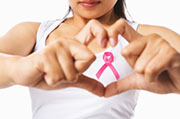- Recognizing the Signs of Hypothyroidism
- 10 Strategies to Overcome Insomnia
- Could Artificial Sweeteners Be Aging the Brain Faster?
- Techniques for Soothing Your Nervous System
- Does the Water in Your House Smell Funny? Here’s Why
- Can a Daily Dose of Apple Cider Vinegar Actually Aid Weight Loss?
- 6 Health Beverages That Can Actually Spike Your Blood Sugar
- Treatment Options for Social Anxiety Disorder
- Understanding the Connection Between Anxiety and Depression
- How Daily Prunes Can Influence Cholesterol and Inflammation
Most Women Don’t Understand Their Breast Cancer Risk: Survey


WEDNESDAY, Sept. 4Most women do not have an accurate idea of their personal risk of breast cancer, according to a new survey that polled more than 9,000 women.
“Only 9.4 percent of the women surveyed were accurately able to tell you their lifetime breast cancer risk,” said study researcher Dr. Jonathan Herman.
Four in 10 women had never discussed their personal breast cancer risk with a doctor, according to Herman, an obstetrician and gynecologist at Hofstra North Shore-LIJ Medical School in New Hyde Park, N.Y.
He is due to present his survey findings Sunday at an American Society of Clinical Oncology breast cancer meeting in San Francisco. The data and conclusions should be viewed as preliminary until published in a peer-reviewed journal.
The research began in 2010 after Herman’s daughter, Sarah, then 13, wanted to find out if her father’s contention about women not understanding their breast cancer risk was true. Together, they surveyed 9,873 women, aged 35 to 70, who were having breast cancer screening at 21 mammography centers in New York.
The women estimated their own risk of developing breast cancer over the next five years and over their lifetime. The Hermans also obtained information about the women’s ethnicity, health insurance, personal and family history of breast cancer, and any previous discussions with their doctors to assess breast cancer risk.
The researchers calculated each woman’s actual risk, using information provided, then compared that to the risk the patient had estimated. If the woman’s estimate differed from the calculated risk by more than 10 percent, it was termed inaccurate.
In all, just 9.4 percent accurately estimated their risk, while nearly 45 percent underestimated and nearly 46 percent overestimated. White women were likely to overestimate, while black, Asian and Hispanic women were likely to underestimate, the findings showed.
Having an accurate risk estimate, Herman said, can help women decide what steps to take — whether they may need closer screening or to go on chemoprevention with drugs such as tamoxifen that reduce breast cancer risk.
In the general population, women have a 12 percent, or one in eight, lifetime risk of breast cancer. That increases to 20 percent, Herman said, if a woman’s mother had breast cancer. If she tests positive for the BRCA mutations that boost breast cancer risk, the risk goes up to roughly 70 percent.
The survey findings come as no surprise to Dr. Mary Daly, chair of clinical genetics at Fox Chase Cancer Center, in Philadelphia, and director of its risk assessment program.
“When we ask women, what is the risk in the general population, and what is your risk compared to that, they can put themselves in a general category, of low, average and so on, but not [more] specific,” said Daly, who reviewed the new findings but was not involved with the survey.
More women may have considered their own breast cancer risk after media attention about actress Angelina Jolie’s recent decision to have a preventive double mastectomy after her mother died of ovarian cancer and Jolie tested positive for a BRCA gene mutation. BRCA1 and BRCA2 mutations increase the risk of breast and ovarian cancers.
The news about Jolie raised awareness in a good way, Herman said, with women seeking advice about what to do and whether they need the test.
At Fox Chase, there was a rise in requests for genetic testing, but many of the women asking about it were in the high-risk group, Daly said, so it was appropriate.
In the survey, black women underestimated their risk, which is lower than that for white women, Daly said. “Their incidence rates are lower, but their survival is also lower,” she said, as a more aggressive cancer can strike them.
Most important, Daly said, is for women to learn their family history. “We like to go back at least two generations, parent and grandparents, on both sides.”
Once a woman knows her risk, she needs to know if the screening schedule she follows is appropriate and what else she should be doing, Herman and Daly agreed.
More information
To learn more about breast cancer risk factors, visit the American Cancer Society.
Source: HealthDay
Copyright © 2026 HealthDay. All rights reserved.










